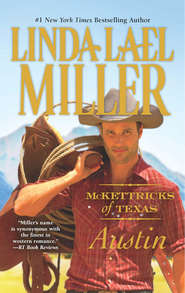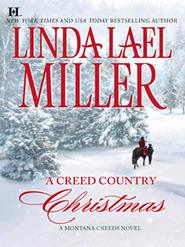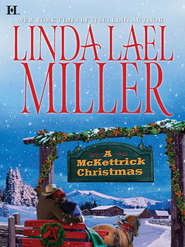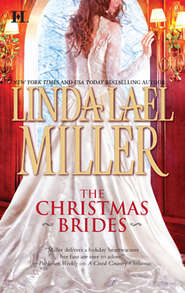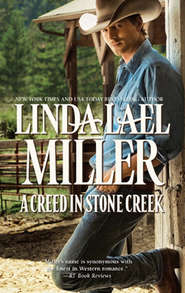По всем вопросам обращайтесь на: info@litportal.ru
(©) 2003-2024.
✖
A Lawman's Christmas: A McKettricks of Texas Novel
Автор
Год написания книги
2018
Настройки чтения
Размер шрифта
Высота строк
Поля
Imagining how she must have looked to Clay McKettrick, rushing out of the house, scaring the chickens half to death in the process, she closed her eyes for a moment, then sighed again.
Edrina and Harriet watched her from the big rocking chair over by the wood-burning stove, Edrina wisely holding her tongue, Harriet perched close beside her, her rag doll, Molly, resting in the curve of one small arm.
The regulator clock ticked ponderously on the wall, lending a solemn rhythm to the silence, and snow swirled past the windows, as if trying to find a way in.
Dara Rose shivered.
“What are we going to do, Mama?” Edrina asked reasonably, and at some length. She was a good child, normally, helpful and even tempered, but her restlessness and curiosity often led her straight into mischief.
Dara Rose looked up at the oval-framed image of her late husband, Parnell Nolan, and her throat thickened as fresh despair swept over her. Despite the scandalous way he died, she missed him, missed the steadiness of his presence, missed his quiet ways and his wit.
“I don’t rightly know,” Dara Rose admitted, after swallowing hard and blinking back the scalding tears that were always so close to the surface these days. “But never you mind—I’ll think of something.”
Edrina slipped a reassuring arm around Harriet, who was sucking her thumb.
Dara Rose didn’t comment on the thumb-sucking, though it was worrisome to her. Harriet had left that habit behind when she was three, but after Parnell’s death, nearly a year ago now, she’d taken it up again. It wasn’t hard to figure out why—the poor little thing was frightened and confused.
So was Dara Rose, for that matter, though of course she didn’t let on. With heavy-handed generosity, Mayor Ponder and the town council had allowed her and the children to remain in the cottage on the stipulation that they’d have to vacate when a marshal was hired to take Parnell’s place.
“Don’t worry,” Edrina told her sister, tightening her little arm around the child, just briefly. “Mama always thinks of something.”
It was true that Dara Rose had managed to put food on the table by raising vegetables in her garden patch, taking in sewing and the occasional bundle of laundry and sometimes sweeping floors in the shops and businesses along Main Street. As industrious as she was, however, the pickings were already slim; without the house, the situation would go from worrisome to destitute.
Oh, she had choices—there were always choices, weren’t there?—but they were wretched ones.
She could become a lady of the evening over at the Bitter Gulch Saloon and maybe—maybe—earn enough to board her children somewhere nearby, where she could see them now and then. How long would it be before they realized how she was earning their living and came to despise her? A year, two years? Three?
Her second option was only slightly more palatable; Ezra Maddox had offered her a job as his cook and housekeeper, on his remote ranch, but he’d plainly stipulated that she couldn’t bring her little girls along. In fact, he’d come right out and said she ought to just put Edrina and Harriet in an orphan’s home or farm them out to work for their keep. It would be good for their character, he’d claimed.
In fact, the last time he’d come to call, the previous Sunday after church, he’d stood in this very room, beaming at his own generosity, and announced that if Dara Rose measured up, he might even marry her.
The mere thought made her shudder.
And the audacity of the man. He expected her to turn her daughters over to strangers and spend the rest of her days darning his socks and cooking his food, and in return, he offered room, board and a pittance in wages. If she “measured up,” as he put it, she’d be required to share his bed and give up the salary he’d been paying her, too.
Dara Rose’s final prospect was to take her paltry savings—she kept them in a fruit jar, hidden behind the cookstove in the tiny kitchen—purchase train tickets for herself and her children and travel to San Antonio or Dallas or Houston, where she might find honest work and decent lodgings.
But suppose she didn’t find work? Times were hard. The little bit of money she had would soon be eaten up by living expenses, and then what?
Dara Rose knew she’d be paralyzed by these various scenarios if she didn’t put them out of her head and get busy doing something constructive, so she headed for the kitchen, meaning to start supper.
Last fall, someone had given her the hindquarter of a deer, and she’d cut the meat into strips and carefully preserved it in jars. There were green beans and corn and stubby orange carrots from the garden, too, along with apples and pears from the fruit trees growing be hind the church, and berries she and the girls had gathered during the summer and brought home in lard tins and baskets. Thanks to the chickens, there were plenty of eggs, some of which she sold, and some she traded over at the mercantile for small amounts of sugar and flour and other staples. Once in a great while, she bought tea, but that was a luxury.
She straightened her spine when she realized Edrina had followed her into the little lean-to of a kitchen.
“I like Mr. McKettrick,” the child said conversationally. “Don’t you?”
Keeping her back to the child, Dara Rose donned her apron and tied it in back with brisk motions of her hands. “My opinion of the new marshal is neither here nor there,” she replied. “And don’t think for one moment, Edrina Louise Nolan, that I’ve forgotten that you ran away from school again. You are in serious trouble.”
Edrina gave a philosophical little sigh. “How serious?” she wanted to know. “Very serious,” Dara Rose answered, adding wood to the fire in the cookstove and jabbing at it with a poker.
“I think we’re all in serious trouble,” Edrina observed sagely.
Out of the mouths of babes, Dara Rose thought.
“Do we have to be orphans now, Mama?” Harriet asked. As usual, she’d followed Edrina.
Dara Rose put the poker back in its stand beside the stove and turned to look at her daughters. Harriet clung to her big sister’s hand, looking up at her mother with enormous, worried eyes.
“We are a family,” she said, kneeling and wrapping an arm around each of them, pulling them close, drawing in the sweet scent of their hair and skin, “and we are going to stay together. I promise.”
Now to find a way to keep that promise.
Chapter 2
The snow was coming down harder and faster when Clay returned to Blue River from the high ridge, where he’d breathed in the sight of his land, the wide expanse of it and the sheer potential, Outlaw strong and steady beneath him.
Dusk was fast approaching now, and lamps glowed in some of the windows on Main Street, along with the occasional stark dazzle of a lightbulb. Clay had yet to decide whether or not he’d have his place wired for electricity when the time came; like the telephone, it was still a newfangled invention as far as he was concerned, and he wasn’t entirely sure it would last.
At the livery stable, Clay made arrangements for Outlaw and then headed in the direction of the Bitter Gulch Saloon, where he figured the mayor and the town council were most likely to be waiting for him.
Most of the businesses were sealed up tight against the weather, but the saloon’s swinging doors were all that stood between the crowded interior and the sidewalk. A piano tinkled a merry if discordant tune somewhere in all that roiling blue cigar smoke, and bottles rattled against the rims of glasses.
The floor was covered in sawdust; the bar was long and ornately carved with various bare-breasted women pouring water into urns decorated with all sorts of flowers and mythical animals and assorted other decorations.
Clay removed his hat, thumped the underside of the brim with one forefinger to knock off the light coating of snow and caught a glimpse of his own reflection in the chipped and murky glass of the mirror in back of the bar.
He didn’t commonly frequent saloons, not being much of a drinker, but he knew he’d be dropping in at the Bitter Gulch on a regular basis, once he’d been sworn in as marshal and taken up his duties. Douse the seeds of trouble with enough whiskey and they were bound to take root, break ground and sprout foliage faster than the green beans his ma liked to plant in her garden every spring.
One glance told him he’d been right to look for Mayor Ponder and his cronies here—they’d gathered around a table over in the corner, near the potbellied stove, each with his own glass and his own bottle.
Inwardly, Clay sighed, but he managed a smile as he approached the table, snow melting on the shoulders of his duster.
“Good to see you, Clay,” Mayor Ponder said cordially, as one of the others in the party dragged a chair over from a nearby table. “Sent a boy to fetch your trunk from the depot,” the older man went on, as Clay joined them, taking the offered seat without removing his coat. He didn’t plan on staying long. “You didn’t say where you wanted your gear sent, so I told Billy to haul it over to the jailhouse for the time being.”
“Thanks,” Clay said mildly, setting his hat on the table. At home, the McKettrick women enforced their own private ordinance against such liberties, on the grounds that it was not only unmannerly, but bad luck and a mite on the slovenly side, too.
“Have a drink with us?” Ponder asked, studying Clay thoughtfully through the shifting haze of smoke. The smell of unwashed bodies and poor dental hygiene was so thick it was nearly visible, and he felt a strong and sudden yearning to be outside again, in the fresh air.
Clay shook his head. “Not now,” he said. “It’s been a long day, and I’m ready for a meal, a hot bath and a bed.”
Ponder cleared his throat. “Speaking of, well, beds, I’m afraid the house we offered you is still occupied. We’ve been telling Dara Rose that she’d have to move when we found a replacement for Parnell, but so far, she’s stayed put.”
Dara Rose. Clay smiled slightly at the reminder of the fiery little woman who’d burst through the door of that shack a couple of hours before when he showed up with Edrina, stormed through a flock of cacophonous chickens and let him know, in no uncertain terms, that she wasn’t at all glad to see him.
There had been no shortage of women in Clay McKettrick’s life—he’d even fallen in love with one, to his eventual sorrow—but none of them had affected him quite the way the widow Nolan did.
“No hurry,” Clay said easily, resting his hands on his thighs. “I can get a room at the hotel, or bunk in at the jailhouse.”






